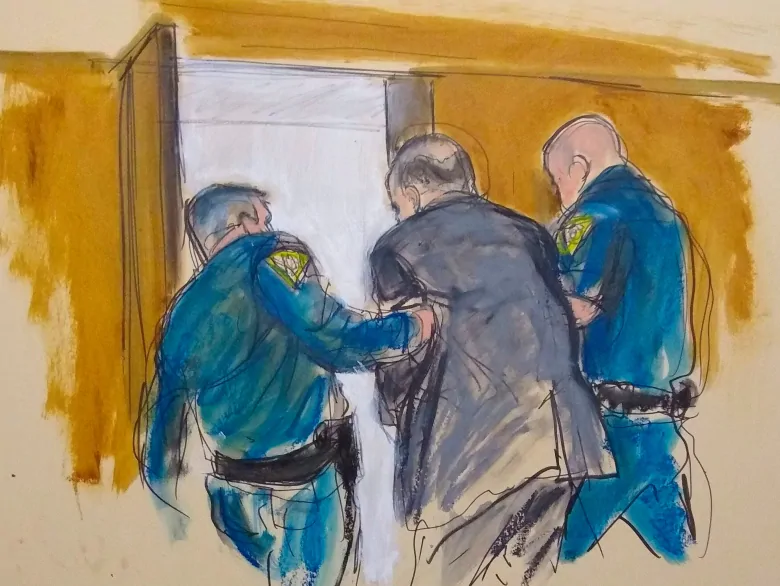Harvey Weinstein back in court for sentencing over rape, sexual assault

Harvey Weinstein, who once held so much sway over Hollywood that Meryl Streep referred to him as “God” in a 2012 acceptance speech, is returning to court on Wednesday in New York, where he could be sentenced to up to 29 years in prison for rape and sexual assault.
It’s a stunning fall for the former powerhouse movie mogul and marks a significant milestone for the #MeToo movement, the global reckoning over sexual harassment and abuse that burned into the public consciousness beginning in fall 2017, in the wake of bombshell exposés alleging widespread sexual misconduct by Weinstein.
Last month, a jury convicted him of third-degree rape against former actress Jessica Mann and a first-degree criminal sex act against former production assistant Miriam Haley, who changed her surname from Haleyi after first going public about Weinstein.
The rape charge carries a maximum sentence of four years in prison, while the charge of first-degree criminal sex act carries a sentencing range of between five and 25 years. Judge James Burke could rule for the sentences to run concurrently.
Regardless of the length of his sentence, Weinstein will be required to register as a sex offender under New York law.
If they wish, Mann and Haley will have an opportunity to speak at Wednesday’s hearing. Weinstein, who declined to take the stand during the trial, will also be given the opportunity to speak.
Prosecutors are seeking severe punishment, submitting a sentencing letter to Burke on Friday that listed multiple sexual assault allegations against Weinstein. In their letter, they reiterated their core argument from the trial: that the former producer had a pattern of isolating and sexually assaulting young women aspiring to show business success.
“The people will ask the court to impose a sentence that reflects the seriousness of defendant’s offences, his total lack of remorse for the harm he has caused, and the need to deter him and others from engaging in further criminal conduct,” prosecutors wrote.
Extended hospital stay
However, defence lawyers made a plea to Burke for leniency, citing Weinstein’s “historic” fall from grace, ongoing health woes and past charitable donations in their call for a five-year sentence, the minimum by law.
Weinstein “cannot walk outside without being heckled” and “has lost his means to earn a living. Simply put, his fall from grace has been historic, perhaps unmatched in the age of social media,” his lawyers wrote.
Because of his ailments, the defence suggested “the grave reality is that Mr. Weinstein may not even outlive [a five-year] term” making it “a de facto life sentence.”
Following sentencing, defence lawyers are expected to file for an appeal of Weinstein’s conviction.
Upon his conviction on Feb. 24, Weinstein was immediately taken by ambulance from the courthouse to a locked unit at New York’s Bellevue Hospital, after defence lawyers told the judge the 67-year-old former film producer required medical attention following a recent, unsuccessful back surgery.
It later emerged that Weinstein has a host of other medical concerns, including high blood pressure, heart palpitations and an eye condition requiring medication.
After spending more than a week at Bellevue, where he underwent an unspecified heart procedure, Weinstein was transferred to the North Infirmary Command at New York’s Rikers Island jail on March 5.
Los Angeles case awaits
During the six-week trial in New York, Burke allowed prosecutors to call Molineaux witnesses, or “prior bad act” witnesses, to testify. Weinstein accusers Dawn Dunning, Tarale Wulff and Lauren Young took the stand to help establish a pattern of abuse, though he was not charged in relation to their specific allegations.
Weinstein had also faced two charges of predatory sexual assault, which encompassed Mann and Haley’s separate accounts as well as the allegation that he had raped actress Annabella Sciorra in the mid-1990s. Sciorra’s allegations alone fell outside the legal statute of limitations for prosecution.
However, several days into deliberations, the jurors indicated they were deadlocked over those charges — the most serious against him — and ultimately did not convict him of predatory sexual assault.
Weinstein, a fixture at the Oscars for producing or distributing a host of acclaimed films (from Pulp Fiction to Shakespeare in Love, Chicago to The King’s Speech), also faces four criminal charges in another of his former stomping grounds: Los Angeles.
The charges — including rape and sexual battery — relate to two separate incidents alleged to have taken place in Feb. 2013, the same week as that year’s Oscars.


